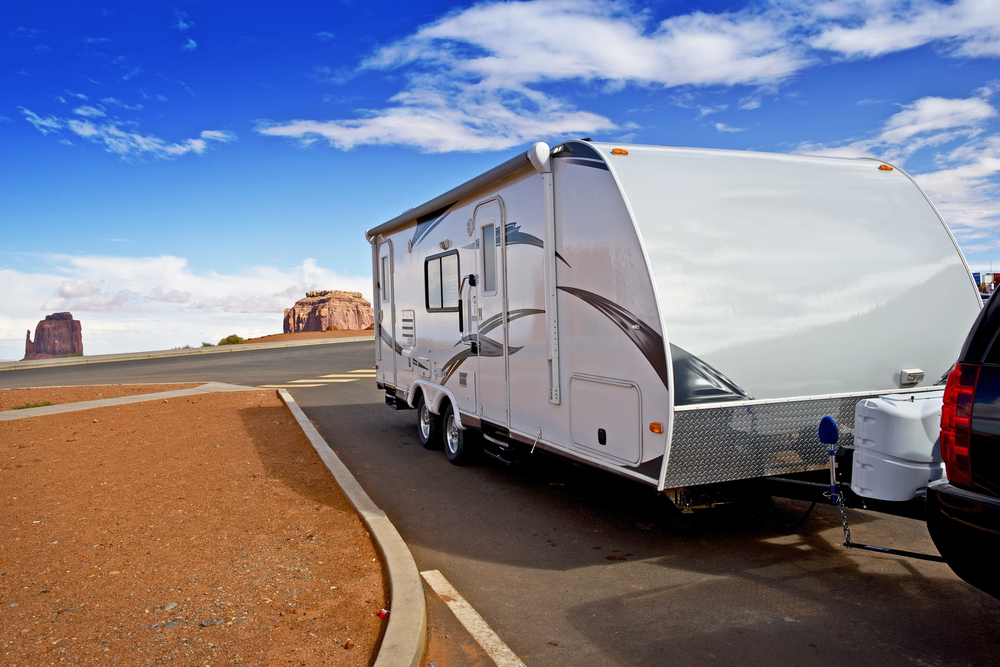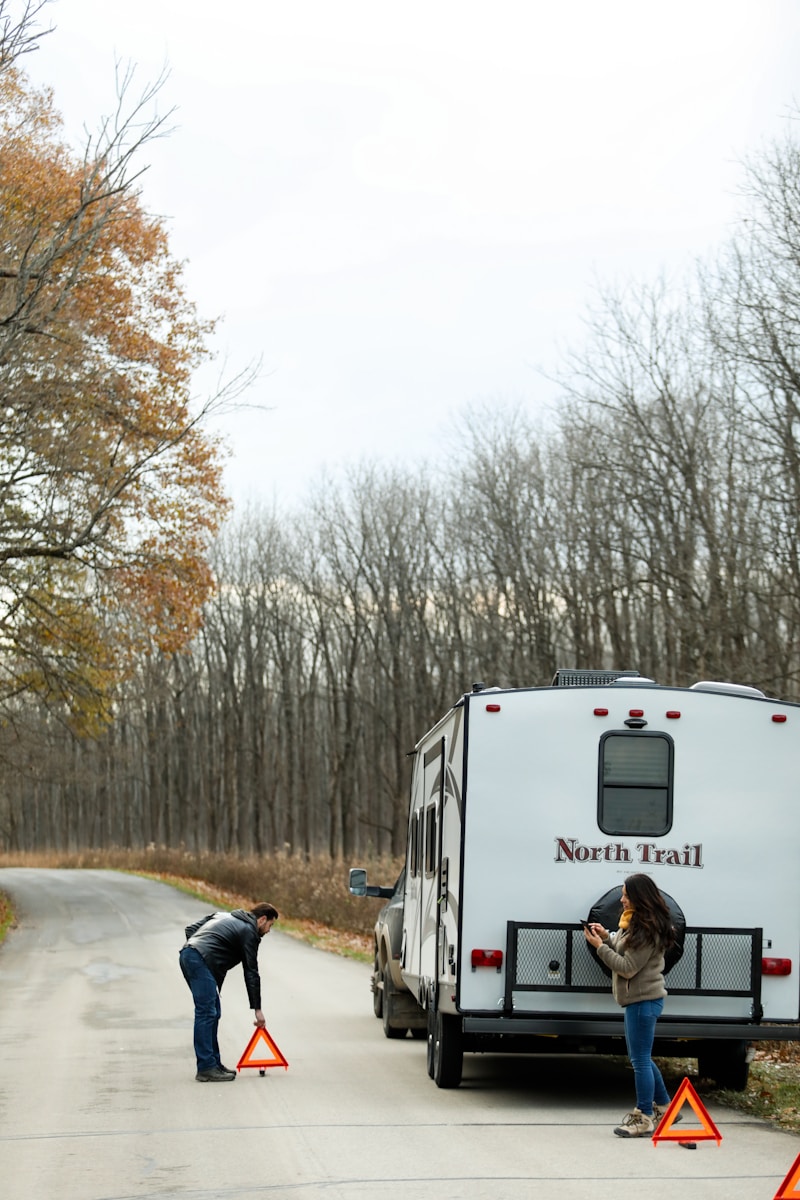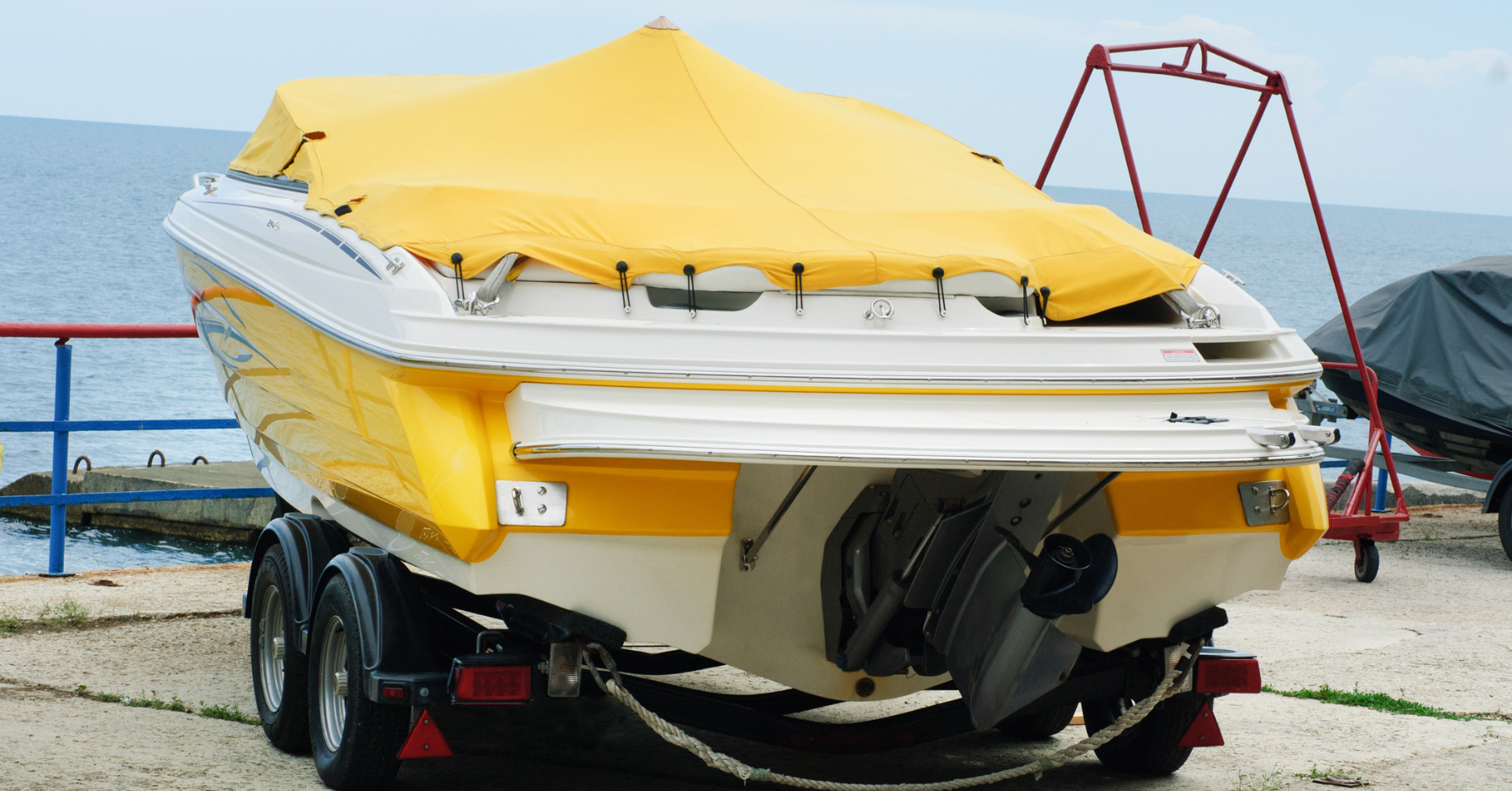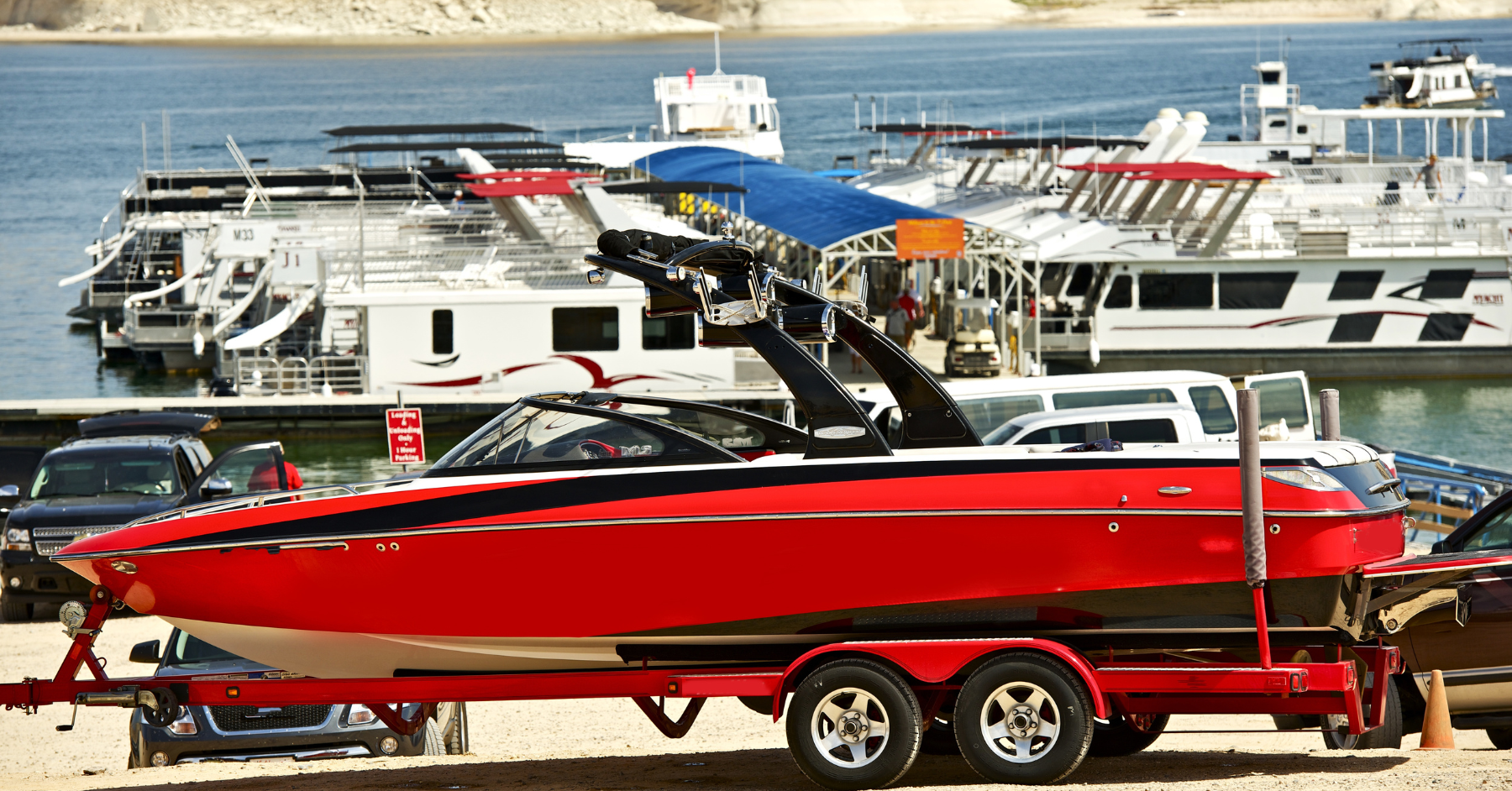Towing an RV is an exciting yet critical aspect of owning one. One of the first steps in safe RV towing is understanding how much weight your vehicle can handle. The freedom of hitting the road with your RV in tow comes with the responsibility of knowing how to safely manage your vehicle and trailer’s weight, stability, and overall performance. Whether you’re new to RV towing or looking to refine your skills, we’ve compiled this detailed guide to ensure every trip is safe, enjoyable, and stress-free.
This guide covers everything from understanding towing capacity to pre-towing checks and route planning, so you can safely tow your RV without hassle. Let’s get started!

Understanding RV Towing Capacity
Towing capacity is the foundation of safe RV hauling. To determine what you can (and can’t) tow, you need to understand two key ratings for your vehicle: Knowing how much weight your vehicle can tow is crucial for safe and efficient RV hauling.
Gross Vehicle Weight Rating (GVWR)
GVWR refers to the maximum weight your vehicle can handle, including its passengers, cargo, fuel, and any added accessories. Exceeding this weight can put undue stress on your vehicle’s frame, suspension, and tires. Understanding how much weight your vehicle can handle helps you stay within safe limits and avoid overloading.
Gross Combined Weight Rating (GCWR)
The GCWR represents the combined maximum allowable weight of your vehicle plus the trailer, including passengers and cargo. This number is vital when determining your safe towing limits. Knowing how much weight your combined setup can handle ensures you stay within safe towing limits.
Why These Ratings Matter:
Knowing the difference between GVWR and GCWR helps you determine how much additional weight (trailer and contents) you can safely tow. Always ensure your combined setup stays within these limits to avoid putting unnecessary strain on your tow vehicle.
You can usually find these ratings under the vehicle’s specifications or on the manufacturer’s sticker in the driver-side door frame.
Determining Your Towing Capacity
Once you know your GVWR and GCWR, calculating your towing capacity is straightforward. Here’s how:
Towing Capacity Formula:
GCWR – GVWR = Maximum Towing Capacity
For example, if your GCWR is 15,000 lbs and your GVWR is 10,000 lbs, then your vehicle’s towing capacity is 5,000 lbs. This means the combined weight of your RV, cargo, and accessories must not exceed 5,000 lbs. Accurately determining how much weight you can tow is essential for safe RV towing.
Key Considerations When Determining Towing Capacity:
- Include the weight of passengers, a full tank of fuel, and any added accessories in your calculations.
- Use the RV’s sticker information and manual to verify its total weight before towing.
- Remember, towing capacity may vary depending on the type of hitch and model of your vehicle.
Towing Capacity and Payload Capacity
Understanding both towing capacity and payload capacity is crucial for safe RV towing. Towing capacity refers to the maximum weight your vehicle can tow, while payload capacity is the maximum weight your vehicle can carry, including passengers, cargo, and added accessories.
To determine your vehicle’s towing capacity, consult the owner’s manual or the manufacturer’s website. The gross vehicle weight rating (GVWR) and gross combined weight rating (GCWR) are key figures in this calculation. The GVWR is the maximum weight your vehicle can handle, while the GCWR is the combined maximum allowable weight of your vehicle and trailer.
Payload capacity includes everything inside your vehicle, from passengers to cargo. It’s essential to calculate the total weight of your RV, including the tongue weight, to ensure you’re within your vehicle’s payload capacity. Exceeding this capacity can compromise towing safety and increase the risk of accidents.
By understanding and respecting these limits, you can safely tow your RV and enjoy a worry-free journey.
Choosing the Right Hitch
A properly chosen hitch is essential for safe towing. The hitch you select must match both your RV and your tow vehicle’s capabilities. Ensure your hitch is rated for how much weight your RV and cargo will add to your tow vehicle.
Hitch Types and Classes
Hitches come in various classes, each designed for specific weight capacities:
- Class I: Up to 2,000 lbs, ideal for lightweight trailers.
- Class II: Up to 3,500 lbs, suitable for midsize SUVs towing smaller RVs.
- Class III-V: Up to 20,000 lbs for larger vehicles like trucks towing heavier trailers.
Each hitch class is designed to handle a specific range of how much weight your trailer and cargo will add.
Weight Distribution Hitches and Sway Control
Weight Distribution Hitches help spread the trailer’s tongue weight across the tow vehicle and trailer axles, improving stability.
Sway Control Devices prevent dangerous trailer sway, especially in strong winds or during high-speed travel.
Ensure your weight distribution hitch is rated for how much weight your trailer and cargo will add to your tow vehicle.
Investing in the right hitch ensures that towing remains stable and stress-free. Always follow the manufacturer’s specifications during installation and maintenance.
Pre-Towing Checks
Before setting off, it’s vital to conduct thorough pre-towing checks. Safety precautions save lives and help avoid costly breakdowns. Before towing, always verify how much weight your vehicle and trailer can handle to ensure safe travels.
Inspect Your RV and Tow Vehicle
- Look for any damage, worn tires, or suspension problems.
Check Tire Pressure and Brakes
- Ensure all tires (RV and tow vehicle) are inflated to the recommended levels, and brakes function properly.
Verify Lights and Signals
- Test brake lights, turn signals, and hazard lights to ensure visibility on the road.
Secure the Hitch
-
Double-check the hitch connection and ensure all chains, pins, and locks are in place.
Safety Inspections and Maintenance
Regular safety inspections and maintenance are vital to ensure safe towing practices. Before embarking on any trip, thoroughly inspect your vehicle and RV for signs of wear and tear. Check the tire pressure, brakes, and suspension of both your vehicle and RV to ensure they are in optimal condition.
Verify that all lights and signals are functioning properly to maintain visibility on the road. Make sure your vehicle’s towing capacity is sufficient for the weight of your RV. Consider having a professional mechanic inspect your vehicle and RV before a long trip to catch any potential issues early.
Regular maintenance can help prevent breakdowns and ensure a smooth towing experience. By staying proactive with inspections and maintenance, you can enhance your towing safety and enjoy a hassle-free journey.
Loading and Distributing Weight
Improper weight distribution can lead to swaying and instability. Follow these tips to distribute weight safely:
Calculate Tongue Weight
-
Tongue weight should be 10-15% of the trailer’s total weight; too little or too much tongue weight can cause sway or instability.
Distribute Weight Evenly
-
Ensure cargo is evenly spread across the trailer’s axles, avoiding any imbalance.
Account for Accessories
-
Don’t forget accessories such as propane tanks, full water tanks, food, and tools when calculating the total weight.
Knowing how much weight your trailer can handle is crucial for proper weight distribution and stability.
Properly distributed weight helps maintain stability and improves overall control while towing.
Tongue Weight and Payload Distribution
Tongue weight is the weight of the RV that is transferred to the tow vehicle. Proper payload distribution is crucial for safe towing. Aim to distribute the weight of your RV evenly, with a slight bias towards the front. Avoid overloading the rear of your RV, as this can cause instability and reduced control.
Using a weight distribution hitch can help spread the weight more evenly across your tow vehicle and trailer. This not only improves stability but also enhances overall towing safety. If you’re unsure about the optimal payload distribution for your RV, consider consulting a professional.
Proper payload distribution can significantly improve towing safety and reduce the risk of accidents, ensuring a smoother and more controlled towing experience.
Safe Towing Techniques
Your driving habits play a major role in towing safety. Here are key techniques for a smooth ride:
- Drive slowly and avoid sudden acceleration or braking.
- Make wider turns to prevent trailer overrunning curbs.
- Maintain a safe following distance and avoid tailgating.
- Avoid towing in high winds, rain, or other adverse weather conditions.
- Use tow mirrors to improve visibility behind the trailer.
Understanding how much weight your vehicle can tow helps you drive safely and avoid accidents.
Towing Tips for a Smooth Ride
To ensure a smooth towing experience, follow these practical towing tips:
- Always drive slowly and cautiously, especially when towing a large RV.
- Use extended side mirrors to improve visibility and reduce blind spots.
- Avoid sudden turns and braking, as this can cause instability and reduced control.
- Ensure your tow vehicle has sufficient towing capacity for the weight of your RV.
- Consider investing in a towing package, which can include features such as a transmission cooler and heavy-duty suspension.
- Practice towing in a safe and controlled environment before embarking on a long trip.
- Stay alert and focused while driving, and take regular breaks to rest and stretch.
- Consider using a towing app or device to help you navigate and monitor your towing experience.
- Always follow local towing regulations and guidelines to ensure a safe and enjoyable towing experience
By adhering to these tips, you can enhance your towing safety and enjoy a smooth, stress-free journey with your RV.
Planning Your Route and Preparing for the Road
Proper planning prevents unpleasant surprises. Before hitting the road:
- Use maps or GPS suitable for RV routes, avoiding low bridges and weight-restricted roads.
- Check for road closures, traffic updates, and weather conditions in advance.
- Carry a roadside emergency kit, including spare tools, a jack, and wheel chocks.
When planning your route, always consider how much weight your vehicle can handle to avoid restricted roads.
A well-prepared trip prevents delays and improves overall safety.
Managing Sway and Stability
Even experienced RV owners encounter sway. Here’s how to manage it effectively:
- Sway Causes: Overloading, uneven weight, and high speeds often contribute to sway.
- Prevention: Use sway bars and maintain a speed appropriate for conditions.
- If sway occurs on the road, avoid sudden movements and gently reduce speed.
Knowing how much weight your trailer can handle helps prevent sway and maintain stability.
Stopping and Parking Safely
When it comes time to stop or park:
- Brake Gradually: Sudden stops can destabilize the trailer.
- Choose Safe Parking Spots: Avoid busy roads and park on steady, level ground.
- Secure Your Rig: Use wheel chocks and parking brakes to stabilize the RV.
When stopping and parking, always consider how much weight your vehicle can handle to ensure stability.
Troubleshooting Common Issues
Even with the best preparation, issues can arise. Be ready to address common problems:
- Tire Blowouts: Keep a spare tire and tools on-hand.
- Brake Failures: Regular maintenance minimizes risks, but use control systems to help stabilize in emergencies.
- Swaying: Ensure proper weight distribution and use sway control devices.
Knowing how much weight your vehicle can handle helps you troubleshoot and address weight-related issues effectively.
When in doubt, consider professional assistance, like contacting Interstate Haulers, to ensure safe and efficient transport of your RV.

Take the Next Step Toward Safe RV Towing
Mastering RV towing takes practice and preparation, but with this guide in hand, you can tackle any trip with confidence. Start by checking your GVWR and GCWR today, and ensure your rig meets all safety specs. Mastering RV towing includes understanding how much weight your vehicle can handle to ensure safety.
- For expert towing services, contact Interstate Haulers to make your next move effortless.
- Share this guide with your fellow RV enthusiasts to spread awareness on towing safety.
- Explore more RV resources on our blog to enhance your adventures!
Learn More About RVs
Expand your knowledge and enhance your RV adventures with these reliable resources:
- Beginner’s Guide to RVing – A comprehensive resource for those new to RVing, covering everything from choosing your RV to setting up camp.
- RV Maintenance Checklist – Learn the essentials of RV maintenance from the Family Motor Coach Association.
- National Park Service Camping Guide – Explore the best campgrounds for RVers in national parks across the U.S.
- RV Safety Tips – Find detailed safety guidelines from the National Highway Traffic Safety Administration (NHTSA).
Educating yourself is the first step to ensuring your RV trips are safe, enjoyable, and hassle-free. Check out these resources and prepare for your next adventure!
Top RV Companies
When purchasing an RV, it’s important to explore reputable manufacturers known for quality, innovation, and customer satisfaction. Below are some of the top RV companies in the industry:
- Winnebago Industries – A trusted name in the RV community, offering a wide range of motorhomes, travel trailers, and camper vans for all types of travelers.
- Thor Industries – One of the largest RV manufacturers in the world, producing highly regarded brands like Airstream, Jayco, and Heartland.
- Forest River – Known for their vast selection of RVs, including fifth wheels, travel trailers, and motorhomes, with a focus on quality and value.
- Airstream– Renowned for their iconic aluminum travel trailers and luxury touring coaches, Airstream is synonymous with timeless design and premium craftsmanship.
- Grand Design RV – Esteemed for their attention to detail, reliable construction, and top-notch customer service, offering options for all RV enthusiasts.
Exploring these reputable companies is a great starting point to finding the best RV for your needs. Take time to compare features, designs, and pricing to make an informed decision.



